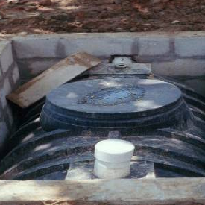
The South Australia Water Authority (or SA Water) is responsible for collecting and treating wastewater in the larger towns of South Australia, such as Adelaide. But many small townships abound throughout the state of South Australia. These townships cannot reap the benefits of availing the services offered to major towns by SA Water. So, the local councils in these townships bear the responsibility of managing the wastewater generated in these townships. They typically achieve this via Septic Tank Effluent Disposal Schemes (STEDS).
An Overview of Septic Tanks and their Functionality
As mentioned earlier, each household in a township will have a septic tank. This tank helps in storing sewage waste, while it settles. The standard rural septic system typically comprises two essential components. These include:
- The septic tank and,
- The leach field
The wastewater from the house reaches the septic tank. In the tank, the separation of the sewage matter takes place. For instance, heavier solids will settle at the bottom of the tank. Similarly, the relatively clear water will rise to the top. From here, this water will leach off (or percolate) into the earth. As such, this water will merge with the greater water table. The likelihood exists that some solid waste particles could escape from the septic tank and emerge from it along with the wastewater. But, the leach field will usually take care of any remaining solid particles of waste that emerge from the septic tank.
Why is it Necessary to Drain Your Septic Tank Regularly?
The wastewater emerges from the septic tank regularly. But, the heavier solid waste material will continue to accumulate at the bottom of the tank. Here, the digestion of anaerobic processes will facilitate the breaking down of these solid waste particles. Even these processes though, have their constraints. For instance, not all solid waste matter in the septic tank will decompose via the anaerobic digestive processes. The remaining solid waste will remain at the bottom of the tank.
With the passage of time, this waste matter will accumulate. As such, it will not take long for the septic tank to reach its capacity. This occurrence could affect the efficiency levels of the septic tank. For instance, large masses of solid waste could escape from the tank and contaminate or pollute the nearby surroundings. The odour emitted by this waste could be highly unpleasant too. This is why it’s necessary for you to hire a septic tank cleaning company for emptying the tank.
What are the Different Methods Used for the Treatment of Septic Tanks?
Treating a septic system involves ensuring that the waste treatment process works at optimal levels. Many experts believe that proper and regular maintenance is the best method for septic tank treatment. This involves inspecting the septic tank and the leach fields regularly. A regular inspection could make it easier to identify the time when you’ll need to empty or pump out the septic tank.
Another aspect of septic tank treatment involves the use of various prevention techniques. These could include:
- Keeping the use of water to a minimum
- Using baking soda or mild detergents for cleaning sinks and toilets as these do not harm the beneficial bacteria that maintain the efficiency levels of the septic system
- Spreading out the consumption of water over several days instead of using excessive water one day and little on the following day and,
- Limiting the use of garbage disposals for reducing the volume of solid waste that enters the septic tank
How Septic Tank Treatment Could Aid in Preventing Septic Pump-outs
Septic systems are usually self-sustaining. The bacteria and the enzymes present in the system facilitate the decomposition of the waste material inside the septic tank. Because of this septic tanks do not usually require pump-outs. This is in complete contrast to holding tanks. It is worth noting that holding tanks simply hold (or contain) the waste matter. They do not treat the water in any way. Thus, once these holding tanks reach their capacity, pumping the waste out of them becomes a necessity.
Many septic tank users maintain their tanks with cleaning products that facilitate the proliferation of beneficial bacteria. These products enable the bacteria to break down the waste more efficiently. At the same time, they keep the lines going to and from the septic tank clean and free from clogs or blockages.
Nitschke Liquid Waste – Your Friendly and Professional Liquid Waste Company in Adelaide
Not all liquid waste companies deliver superlative levels of service that fit into your budget. This is why many residents of Adelaide and the adjoining areas prefer using the services offered by Nitschke Liquid Waste. We have over 20 years of experience in this industry. A 100% South Australian Family Owned and operated company, we comply with all the requirements specified by SA Water and OH&S. In addition, we’re fully insured and EPA licensed as well. Save $20 on your first service call. Call us at 08 8260 7660 now.



